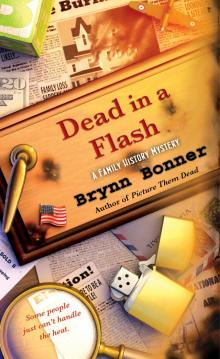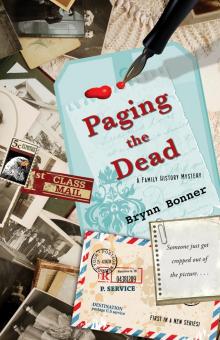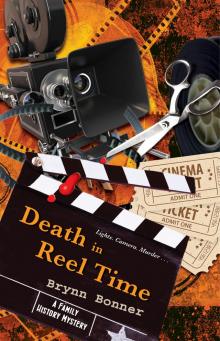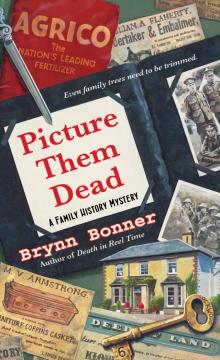- Home
- Brynn Bonner
Dead in a Flash Page 2
Dead in a Flash Read online
Page 2
“One hot summer day my father and I went into our little town of Coventry to buy farm supplies. My father was an attorney, but he fancied himself a gentleman farmer and we kept considerable acreage under cultivation. We had a farm manager, Luther Hamilton, who ran the farm in all the practical ways, but our father liked to keep a hand in. It was an idyllic life. I loved following Luther around and learning how the place operated, and he was tolerant of my tagging along. And in the small-world way of things, it’s Luther’s son, Cyrus Hamilton, who owns this very beautiful hotel in which we sit. The American dream in two generations.
“But I digress. On that August day my father and I, as was our habit, went to a greasy-spoon burger joint we liked and had a hamburger and a Coca-Cola while the men loaded our supplies into the truck. I remember feeling perfectly happy. I loved spending time with my father. He was a learned man and very witty. I was a boy of twelve and felt honored and validated that my father treated me like a man and talked to me as he might have spoken to a peer. That is my last precious memory of life before. You see, for Lenora and me life will forever be cleaved into before and after that day.
“As we drove home that afternoon, we had the windows down to get some relief from the sweltering heat. We were badly in need of rain, and one could smell baked earth in the still air. I leaned my elbow on the window ledge in imitation of my father and squinted out across the stand of tobacco growing in our nearest neighbor’s fields. In the distance I saw a plume of smoke and asked my father what he thought that might be.
“A look of panic came over his face and he started muttering ‘Oh, dear God,’ over and over. My father was not one to blaspheme and his doing so made my blood run cold. We approached a bend in the road and as I got myself acclimated, I realized the smoke was coming from our house. He turned down our gravel road and pushed the truck to its limit. The road was in a sorry state and we jostled along with me bouncing until my head hit the cab’s roof—this in the days before seat belts. I wanted to tell my father to slow down, but instead urged him to hurry. I tried to convince myself it was just our mother burning trash or that Suzette, the woman who came sometimes to help Mother with the household chores, had taken it into her head to make homemade soap at the wash pot as she sometimes did. But I knew that was far too much smoke for either of those possibilities.
“When, at last, the house came into sight, it was an abomination to behold. It was in full flame and the structure was starting to break apart. We flew into the yard and my father was out of the truck before it had completely stopped moving. I caught sight of Mother and Lenora at the edge of the yard with two of the neighbor men and saw some field hands wrestling with a hose, trying to get it to reach the house from the outdoor spigot, though it was useless. Mother was in hysterics and pulling against the men, who were holding her back, and Lenora was on the ground crying and coughing, holding desperately to Mother’s dress tail.” He turned to Lenora and gestured to her to continue the story.
“Mother had already run back into the house twice, trying to get to Johnny,” she said, blinking back tears. “It was too late to hold any hope he’d survived, yet she was straining to go back again even as the house began to fall. When she caught sight of Daddy, she screamed that Johnny was still inside, and he ran toward the conflagration. But at that moment it collapsed.”
“It was sheer horror,” the senator said. “For all of us.”
“Was there no fire department?” I asked.
Lenora sniffed. “It was a volunteer department. We had a fire chief and one ancient pumper truck. But the notification was by phone tree and some of the volunteers didn’t even have phones, so someone had to actually go out and find the men.”
“Needless to say, the response time was not what one would call swift,” Senator Stan said. “They finally arrived over an hour later and put out the last glowing embers. All the damage had already been done by then, but alas, there was more, less tangible, damage to come.”
Lenora heaved a sigh. “You see, despite all the evidence to the contrary, neither of our parents could accept that Johnny died in that fire. They simply couldn’t accept it. Mother latched onto the idea that he’d been kidnapped and the fire was set to cover the crime. And in some sort of folie à deux Father came to believe it, too. Each was haunted by the conviction that Johnny was still alive out there somewhere. They searched for him until the end of their days. It was a shadow over their lives and over ours.”
“Indeed.” The senator nodded. “But it didn’t turn them into different people. This article makes them look like obsessive nuts, which they weren’t. They were simply parents who’d lost a beloved child and their heartbreak was so immense, it would’ve surely killed them if they’d let in the grief, so they built a different reality for themselves. I’ve mentioned that our code of conduct was to help those in need, and our parents were surely in need. There were folks back then, most well-intentioned who encouraged them in their denial, like alchemists trying to spin sorrow into hope. And sadly there were others who spurred them who might not have had such pure motives.” He spat the words, his face hardening into a stony glare.
“We learned to live with this,” Lenora said, her voice quiet. “In the early years, from time to time, a person would show up with a toddler or a young boy claiming he was Johnny, and our parents would be filled with hope, despite their efforts to remain skeptical. Then we’d all live in limbo until the claimants were investigated and found to be charlatans. It was taxing. And it didn’t help matters that the case was horribly bungled, leaving the door open for these people to take advantage.”
Just then Lincoln opened the door and stuck his head inside as if afraid to enter. “Sorry to interrupt,” he said, “but Mrs. Dodd has arrived and wonders if you and Lenora are free for dinner.”
“Yes, yes, of course,” the senator said, “please tell her we’ll be right along—a half hour at most. And Lincoln, I’m sorry for having shouted at you earlier. This whole thing has put me in ill temper. Are you sure there’s nothing we can do?”
“I’m sure, Senator,” Lincoln said. “Nothing’s been said that was patently untrue. You know better than me about libel laws.”
“I do know,” the senator said with a sigh. Then he turned back to Esme and me, and something about the look on his face made me tense.
“When all this brouhaha over my birthday is done with, I’d like to engage you two to prepare a report for me to sort out all the facts surrounding that fire and lay the rumors to rest once and for all.”
Lincoln took a step into the room. “Uh, Senator, I could do that for you,” he said. “I’m not sure—”
“No, no,” the senator said. “You’re needed elsewhere. We have to get this confounded book finished. It’s been three years now and two extensions. The publisher is losing patience. And besides, these two have a reputation for digging into the past and getting answers. Sophreena and Esme, will you take on this investigation for me and Lenora?”
“Senator, this is a little out of our wheelhouse,” I said. “We’re not private investigators or public relations people. We don’t have press contacts. Even if we researched this for you, we’d have no way of getting the story out.”
“I have people for that,” Senator Stan said. “You just look at the evidence and document the findings. We’re not asking you to solve a mystery. There is no mystery. Let me be clear, neither Lenora nor I have a shred of doubt that Johnny died in that fire. We were both there, after all. It’s just that we don’t want our parents remembered only for how they reacted to this tragedy.”
“And there’s a more practical reason we’d like your help at this particular time,” Lenora said, turning back to the senator.
“Yes, our parents had a proviso in their will,” he said. “They set aside a sum of money in a trust that was to go to Johnny in the event he was ever found. It’s not a jaw-dropping amount, but it’s enough to bring false claimants out of the woodwork, and since Chad Deese mentioned th
is fact in his despicable scribblings, the timing could not be worse.”
“But surely those claims could be dealt with easily enough with a DNA test,” I said.
“Yes, our entire family got tested as soon as it was accepted in the courts. Lenora and I and our parents are all on file. But while DNA testing would eliminate claimants in short order and the onus of proof is on the claimant, it is a terrible intrusion into our family life, and every new claim will likely attract more bad press. The money reverts to Lenora and me on baby Johnny’s birthday this year, which is one month hence. We plan to use the funds to establish a foundation in his name to provide educational opportunities for low-income families. Our good friend Dinah Leigh Dodd has offered to match our seed funds, and my grandson Damon will direct the foundation. I want no hint of scandal or legal entanglements to become attached to this endeavor. This is to be a credit to our parents and our dear baby brother, not more fodder for the rumor mill.”
“But, Senator,” I protested, “that’s even more reason why a lawyer or an investigator would be a much better choice.”
“Trust,” Lenora said softly. “That’s the key. We trust you two to handle this. Would you be willing to take it on, as a personal favor to us?”
Esme and I looked at each other and while she didn’t say it aloud, I got the message clear enough. I told you you’d jinxed us.
two
“I FEEL LIKE I’M CARRYING a hundred-pound sack of expectations on my back,” Esme said as we passed through the cathedral-like lobby of the Mystic Lake Hotel. “I’m happy those two have confidence in us, but I don’t know if we can deliver on this one, Sophreena. We should have told them so.”
I sighed. “I tried, but you’re right, I should have been more emphatic. You saw how distressed they were. And anyway, as you said this morning, Lenora hired us for this gig and we owe her.”
“Yeah, but the flip side is it could hurt us—and them—if we fail,” Esme said. “I can’t imagine we’ll be able to find out anything now, all these years later, that a whole passel of law enforcement folks and fire investigators overlooked more than a half century ago.”
“Probably not, but it won’t hurt to put fresh eyes on it. And anyhow, they’re not asking us to disprove findings, only that we certify them, right? Who knows, maybe we’ll get lucky and you’ll get some back-channel information we can use.”
“Sophreena, you know better than anybody that’s not how it works,” Esme said. “It’s a one-way call from Beulah land.”
The “it” was Esme’s gift, or her curse, as she often pegged it, of being able to receive communications from the dead. Most often these were maddeningly enigmatic messages composed of images, cryptic words, vague feelings, or occasional musical passages. There had been times when this helped us spectacularly in our family history searches, but more often it was just a pain. It created confusion and only made sense once we turned up solid facts with more conventional research methods and could see it in context.
“I was kidding, sort of,” I said, looking up to admire the sparkle of the massive chandeliers suspended from the two-story atrium of the lobby. “We’ll just have to give it our best, and anyway, we’ve got to finish up this job first. We’ll worry about it later.”
“Okay, Scarlett, we’ll think about it tomorrow,” Esme said.
“Ms. McClure,” someone called, and I turned to see a young man in a bright blue blazer sporting the hotel logo on the pocket. He was trotting in our direction.
“Yes?” I said. “I’m Sophreena McClure.”
“Glad I caught you,” he said, nodding to Esme. “Senator Sawyer sent me to find you and ask you both to come to the restaurant if you would.”
“Okay,” I said, drawing out the word, “though I’m not sure I’m dressed for that.”
He gave my black polyester pants and only slightly stretched-out cotton top the once-over and assured me, very unconvincingly, that I looked fine. Esme, as always, was totally dolled up, so I tried to trail along in her wake as we followed the young man, Esme mumbling every step of the way. “What do they want now? Are we to find Amelia Earhart’s plane? Or maybe track down a yeti?”
As it turned out, they wanted to treat us to dinner in the swanky hotel restaurant for which reservations were next to impossible to get. As a waiter passed carrying a shrimp dish to a nearby table, the aroma made my stomach growl, and my attire suddenly seemed inconsequential, at least to me.
“We’ve already ordered, I’m afraid,” Lenora said. “We weren’t sure we’d be able to catch you.” She asked the waiter to bring more chairs and everyone scooted to make room for us.
Introductions were made as we settled at the table. The attractive older woman sitting on Lenora’s left was Dinah Leigh Dodd. She offered her hand with a warm smile and introduced the younger woman as her assistant, Chelsea Bremer.
The name Dodd sounded familiar but I couldn’t piece together who she was.
“Dinah Leigh is a dear friend and one of my most stalwart supporters. Has been for years,” the senator said as if reading my mind again. “She’s supported me financially, psychologically, and spiritually since I ran for my first public office in nineteen fifty-six. I won that election and became county soil conservation director, for which I was paid the munificent sum of seventeen dollars a week.”
“Times have certainly changed, haven’t they, Stanton? What did you spend on your last campaign?” Dinah Leigh asked, her tidewater accent rolling off her tongue in an indolent flow.
“I don’t like to think about it,” he said, grimacing. “Were I a younger man, I would’ve stayed and entered the fray on campaign finance reform. But I’m too old and weary.”
“It’s absurd,” Lenora said. “So much money spent, even with Stanton running practically unopposed.” She turned to Esme and me. “The political arena aside, Dinah Leigh and I were childhood friends. Well, she and Stanton were childhood friends, too, but you know how big brothers can be.”
“We were dismissed as tagalongs and pests, which I’m sure we were,” Dinah Leigh said with a laugh. She had a nice laugh and an easy manner. I supposed she and Lenora were around the same age. But while Lenora was a handsome woman and very classy, Dinah Leigh looked much younger, perhaps due to her stylish, intentionally messy haircut, the artful makeup job, and the sparkle of mischief in her eye.
The waiter brought us menus, and it took only a few seconds to put in our order, as we’d already heard talk around town about the signature dish called Cioppino à la Aaron. It was the chef’s take on a classic seafood stew with shrimp and mussels and was rumored to be heaven in a bowl.
“So you grew up together in Quinn County?” I asked Dinah Leigh.
“Yes and no,” Dinah Leigh said. “I lived there until I was seven and then, in the most heart-wrenching episode of my young life, my parents moved us to Norfolk, where my aunt lived. My father had lost his job when the graphite plant closed, and he’d gotten on at the shipyards up there. I thought I would absolutely roll up and die from missing Lenora. But we were dedicated pen pals for years, and then the cosmos made up for separating us by granting both of us acceptance at Chapel Hill. We roomed together all four years of college and we’ve stayed close ever since.”
“We’re like sisters,” Lenora agreed, “and we like to do things for each other. Which brings me to a question. I hope you won’t think we’ve invited you here under false pretenses. We really did only have in mind for you to meet Dinah Leigh and Chelsea and share a meal with us. But we were singing your praises about the job you’ve done for Stanton’s celebration while the fellow was trying to find you, and well, one thing led to another. We’d like to ask a favor of you. Our second request in one day, we realize.”
“And if it’s not workable, just say so,” Dinah Leigh put in. “You see, my little brother is getting married in two weeks and he’s lately become a family history buff.” She leaned across the table and wrinkled her nose. “I don’t think he’s very good at it. I�
�d like to hire you to do a family tree for him as a wedding gift. Lenora showed me the one you did for Stanton, and it’s stunning.”
“Thank you,” I said, tilting my head in a way I hoped would indicate modesty. Though I had nothing to be modest about. The illustrated family tree was beautiful. I’d worked very hard to make it that way.
“The thing is,” Dinah Leigh went on, “I’d like it done before the wedding and I know that’s short notice.”
“Let me just check our calendar,” I said, bending down to get it out of my bag. I used those moments to rack my brain for an excuse and mumbled vaguely. “We’ve still got a few things to finish up for the senator and then we’ll be working on that other assignment for you,” I said, giving Lenora a pointed look.
“No need for veiled language, Sophreena,” the senator said. “You may speak freely in front of Dinah Leigh and Chelsea. In fact, talk to anyone you please about it. You have our blanket permission. It’s not as if it hasn’t all been laid bare over the years. Especially by callow writers and ignominious so-called documentarians!”
“Don’t start in on that again, Stanton,” Lenora said. “You’ll just upset yourself and ruin this lovely dinner. ”
The senator nodded, but huffed one last time.
To my surprise, Esme put her hand down near my bag and gestured an emphatic thumbs-up as she pretended to help me find my calendar. I glanced at her face, and she gave me wide eyes and whispered, “Say yes,” through her clenched teeth.
Fine. She’d been the one complaining earlier. I supposed we could work a few late nights to do a favor for a friend of the senator. I told Dinah Leigh we’d be happy to do what we could in the time allowed. “This isn’t the time or place to talk about our price list. Would you like me to call you tomorrow?” I asked.

 Dead in a Flash
Dead in a Flash Paging the Dead
Paging the Dead Death in Reel Time
Death in Reel Time Picture Them Dead
Picture Them Dead